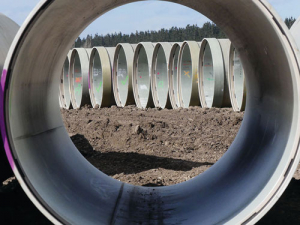Stage 1 of the main scheme takes water from an intake on the Rakaia River and services 23,000ha via a 17km open canal terminating near Hororata.
Stage 2, under construction since April, will take water from the end of the existing stage 1 canal to service another 20,000ha in the northeast half of the CPW area. It will be underground, using 2.5m and 2m diameter glass-reinforced plastic pipes for the main trunks.
CPWL chief executive Derek Crombie referred to the very wet winter, especially heavy rain a month ago that affected everything. The Hororata River crossing site, where the pipe will be buried about 5m below the river bed, had been flooded twice but that will not affect the completion date, about April next year.
Meanwhile, the physically separate Sheffield scheme is due to come on stream by early October. That will take water from the Waimakariri River and service about 4100ha in the northwest corner of the CPWL coverage area, from a 2 million cu.m storage pond now being lined.
Crombie said in mid-September that the contractor, Fulton Hogan, needed only about 15 days good weather to finish off the HDPE plastic lining of the dam; that meant not too windy, when the plastic sheet would be too unwieldy, or too cold, which would make it brittle.
Only “a little bit of infill pipe” is needed to complete the rest of the infrastructure.
The completed dam will take 14 days to fill, but water draw-off can begin at a depth of only 2 - 3m.
The Sheffield scheme will service 33 shareholder farms and Crombie said most already have their farm infrastructure ready to go.
Meanwhile, Crombie said two separate protest occupations by Greenpeace activists had negligible impact on the progress of either scheme.
On August 2, activists chained themselves inside one of the pipes on the stage 2 construction site but that only briefly stopped work at that one site. On any day there would be work going on at about eight sections, he said.
On September 7 activists occupied the floor of the Sheffield scheme dam site before being removed by police after about eight hours.
Crombie said the protests had minor effects “but [according to] their website they stopped the world”.
“We’re frustrated that the information they’re giving out is selective and misleading; saying things like we’re polluting the rivers is simply not correct because we don’t have any discharge into the Waimakariri, the Selwyn or the Rakaia.
“At the same time, we’ve said to them we have no problem with peaceful demonstration; that’s a democratic right. We have a problem with them over illegal occupation or illegal trespass.”
Responding to the Greenpeace charge that irrigation would expand intensive dairying, Crombie said there is no doubt that irrigation can support dairy farming.
“But the other side of it – and this is where they’re not saying anything – is that Environment Canterbury have put very stringent operating conditions on dairying and other types of farming. If you convert to a dairy farm now you have to comply with those conditions.”
Crombie pointed out that the three broad types of soils in the CPWL area include very good soils for high-end cropping around Darfield, Kirwee and Sheffield; middle-grade soils that do not hold water quite as well and are used for sheep and beef units; and stoney soils on the south sector near the Rakaia where dairy has prospered.
That area was fully developed for dairy before the CPW scheme, but using groundwater for irrigation. Crombie said the scheme allows them to turn off groundwater and replace it with surface water, to the benefit of the aquifers and lowland streams.

















